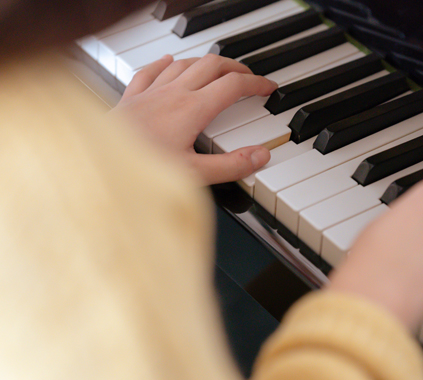Untitled Work
Yuk-Yan Lam
© Copyright
1999 by Yuk-Yan Lam

Photo by Charles Parker at Pexels.
Untitled WorkYuk-Yan Lam
© Copyright
1999 by Yuk-Yan Lam
|
 Photo by Charles Parker at Pexels. |
The lights were adjusted to their usual dimness. As I walked into the nursing home, clutching my music books, I saw the familiar sight of the soft, pine green carpet and the old, cushioned chairs. Like every other Friday afternoon, I stepped quietly into the "Activities Room" and found my sign-in sheet in the white binder labeled Volunteers. "1 hour," I marked for the date, May 7, 1999. I couldn't help but notice the pages with names that hadn't been touched for months. Judy Buncher, the director of activities, greeted me in her usual cheery way. How she managed to remain so happy working there is still a mystery to me. I peered into the sitting room, and there they were, my audience, expecting me just like every other week. All the eyes of those who could still see were on me. Elmer, a nearly blind, old man in a wheelchair, was there too. I noticed him in particular because he was there every week.
I sat down on the wooden bench with chipped edges that matched those of the old piano. I took out my music slowly, deliberately. They were waiting. I looked at them. Behind their deep eyes, withered skin, and wrinkled faces, they were still people. People with feelings but too powerless to act upon them. And by some mishap of fate were left in this neglected corner of the world, forgotten by family too preoccupied with other things to take them into their homes. Or perhaps some of them didn't have families left. I felt tormented that all I could do was contribute this one measly hour a week when I played music in foolish hopes that they could forget their sadness for a while.
And so, I began to play. The piano, which hadn't been tuned in years, sounded notes that were desperately broken and off-key, but they didn't care. After each piece, they clapped dutifully if they were able to. Out of appreciation or out of polite conformity, I did not always know. Sometimes, I heard one or two people muttering compliments under their breath. Once, in an especially memorable experience, an old lady, deprived of all coherent speech by a certain disease, hummed and swayed to a song I was playing. Other times, Chopin's waltz (with the help of Judy) inspired those who could to get up and start dancing. Often, the staff workers would put down their work for awhile and stop to listen. In other cases, an oblivious lady with a vacuum cleaner or a bustling custodian would walk by, and Elmer would always say with a child-like fervor, "SHH!"
The hour passed by. Dad was waiting at the door. "Thank you so much for coming," I heard from Judy in her bubbly voice. She said this every week. I got up to shake her hand in the usual farewell ritual.
But this time, Elmer spoke up. His eyes, though virtually sightless, looked profound with meaning and sorrow. His voice was anxious but tired, as if a lifetime of speech had worn it away. I noticed his pale blue shirt, faded by the years. "Judy…there's a book in my room," he said.
Judy didn't understand. "Yes, Elmer?" she asked.
"It's called 114 America's Best-Loved Songs. It's in the drawer by the bed, the bottom shelf."
"Oh, do you want Yan-Yan to play from it? I'll get it now."
She left and returned with a yellow, hard cover book, and held it to Elmer. She placed it in his wrinkled hands that were helplessly outstretched. "She's standing to your…right."
Elmer turned towards me slowly, his voice full of sadness unfathomable to me. "This book was my sister's. She died two years ago. You take it home. She could play every song in it and now you can too. It's a gift. You…"
And here he paused and his voice began to waver. Tears started to appear in his sightless eyes as he was determined to continue. "You re…remind me of her. She died two years ago," he unconsciously repeated again.
As his precious memoir passed from his weathered hands to mine, he began to cry. Judy stepped closer to Elmer and put her arms around him. "It's okay, honey," she said over and over.
I watched him, and I felt my eyes fill up with tears that he could not see. I clutched the treasured book and tried to stop myself from crying. Facing Elmer, I whispered the sincerest 'thank you' I had ever given. "I'll come back next week and…and play some of those songs for you," I promised in a shaky voice.
Elmer didn't hear me. He was still lost in his memories, sobbing, when I walked out in a daze. On the car ride home, I stared out the window and ran my fingers over the old album. I opened it and saw the once-bright yellow color. The name, Elmer Scofield, was penned carefully on the inside cover, dated 1972. I flipped to a song I recognized. My eyes drifted over the familiar words…"Moon river, wider than a mile…I'm crossing you in style, some day…"
I cried harder and held my most prized possession all the way home.
Contact
Yuk-Yan
(Messages are forwarded by The
Preservation Foundation.
So, when you write to an author,
please type his/her name
in the subject line of
the message.)